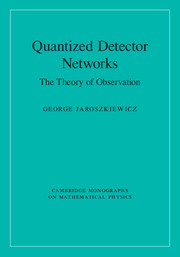Book contents
- Frontmatter
- Contents
- Preface
- Acronyms
- 1 Introduction
- 2 Questions and Answers
- 3 Classical Bits
- 4 Quantum Bits
- 5 Classical and Quantum Registers
- 6 Classical Register Mechanics
- 7 Quantum Register Dynamics
- 8 Partial Observations
- 9 Mixed States and POVMs
- 10 Double-Slit Experiments
- 11 Modules
- 12 Computerization and Computer Algebra
- 13 Interferometers
- 14 Quantum Eraser Experiments
- 15 Particle Decays
- 16 Nonlocality
- 17 Bell Inequalities
- 18 Change and Persistence
- 19 Temporal Correlations
- 20 The Franson Experiment
- 21 Self-intervening Networks
- 22 Separability and Entanglement
- 23 Causal Sets
- 24 Oscillators
- 25 Dynamical Theory of Observation
- 26 Conclusions
- Appendix
- References
- Index
18 - Change and Persistence
Published online by Cambridge University Press: 24 November 2017
- Frontmatter
- Contents
- Preface
- Acronyms
- 1 Introduction
- 2 Questions and Answers
- 3 Classical Bits
- 4 Quantum Bits
- 5 Classical and Quantum Registers
- 6 Classical Register Mechanics
- 7 Quantum Register Dynamics
- 8 Partial Observations
- 9 Mixed States and POVMs
- 10 Double-Slit Experiments
- 11 Modules
- 12 Computerization and Computer Algebra
- 13 Interferometers
- 14 Quantum Eraser Experiments
- 15 Particle Decays
- 16 Nonlocality
- 17 Bell Inequalities
- 18 Change and Persistence
- 19 Temporal Correlations
- 20 The Franson Experiment
- 21 Self-intervening Networks
- 22 Separability and Entanglement
- 23 Causal Sets
- 24 Oscillators
- 25 Dynamical Theory of Observation
- 26 Conclusions
- Appendix
- References
- Index
Summary
Introduction
Our interest in this chapter is in change, which is another way of discussing persistence, or the apparent endurance over intervals of time of spatially extended structures.
Persistence is the phenomenon that underpins all human activity. Given the rule that we may think of as the first law of time, the dictum of Heraclitus that everything changes, persistence is our name for those remarkable processes that appear to circumvent that law and give stability to our lives. We should be interested, for instance, in the fact that when we wake up each morning, we feel that we are the same individuals who went to sleep the previous night. Indeed, without persistence in one form or another, nothing would make sense, including logic, rational thought, and mathematics, for these depend on comparisons of standards and rules that persist in memory with information that we acquire in process time.
Persistence is necessary for physics to make sense. It is emphatically not a metaphysical topic but of the greatest relevance to science, including quantum mechanics (QM). Persistence is implicit in Wheeler's dictum that only acts of observation are meaningful in physics, because observers and their apparatus have to endure long enough to make observations. In quantized detector networks (QDN), the persistence of observers and their apparatus long enough to perform experiments should be regarded as axiomatic.
The subject of persistence is a deep and complex one, and will probably never be fully understood. Several reasons contribute to this.
Observers Themselves are Subject to Change
Contrary to the general implicit belief that the laws of physics transcend the subjective behavior of observers, it is our thesis that this is a vacuous proposition. It cannot be proved; it is just an assertion, albeit a very useful one. A more pragmatic view is the one held throughout this book, that the laws of physics are contextual to observers. Without observers, science means nothing in a literal sense. But according to the first law of time, observers themselves change over time. This includes their memories and the conditioning that they have; these are carried over from one stage to another. If the processes transporting those memories and belief structures change those memories and belief structures, then the laws of physics as understood by the observers at the time change as well.
- Type
- Chapter
- Information
- Quantized Detector NetworksThe Theory of Observation, pp. 250 - 262Publisher: Cambridge University PressPrint publication year: 2017



